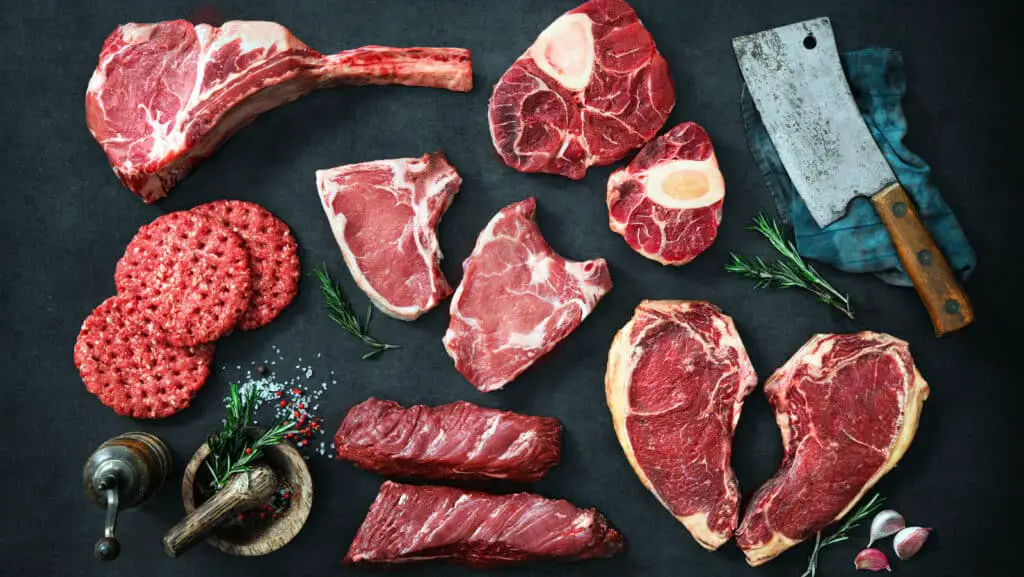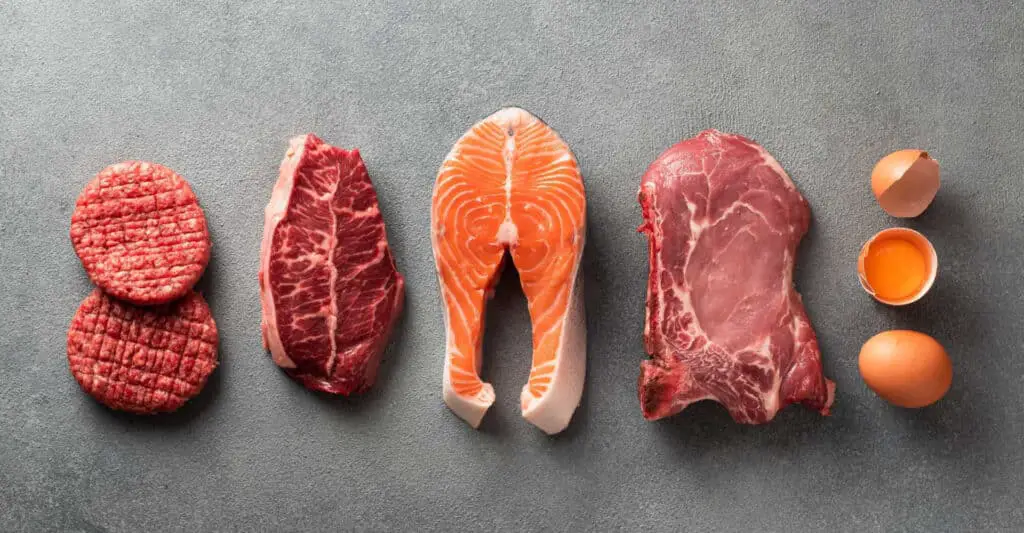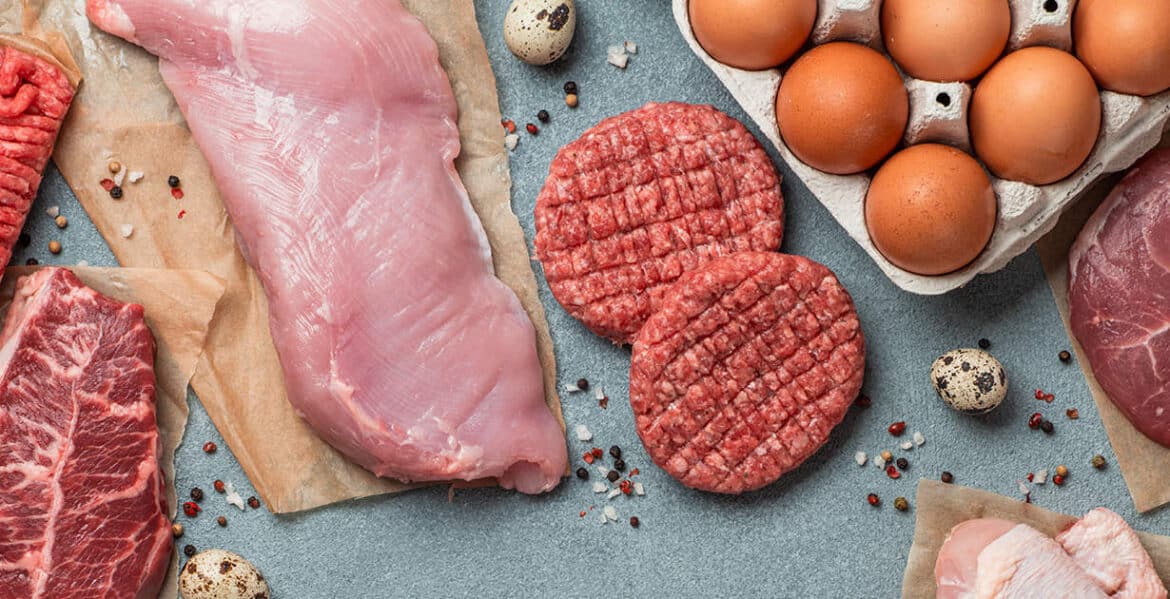Introduction
What Can You Eat In A Carnivore Diet: The carnivore diet is a dietary approach that involves consuming only animal products and excluding all plant-based foods. It is a highly controversial and debated topic in the world of nutrition and health. While most traditional diets emphasize the importance of a balanced intake of fruits, vegetables, grains, and proteins, the carnivore diet takes a completely different approach by focusing solely on animal-based foods.
Proponents of the carnivore diet argue that it can lead to numerous health benefits, including weight loss, improved mental clarity, increased energy levels, and reduced inflammation. They believe that humans are biologically adapted to thrive on a diet primarily consisting of animal products, as our ancestors did for thousands of years.
On the other hand, critics of the carnivore diet express concerns about its potential risks and long-term effects on health. They argue that eliminating plant-based foods can lead to nutrient deficiencies, particularly in vitamins, minerals, and fiber. Additionally, the high intake of saturated fats and cholesterol from animal products may increase the risk of heart disease and other chronic conditions.
Despite the controversy surrounding the carnivore diet, it has gained significant popularity in recent years, with many individuals adopting it as a means to improve their health and well-being. Some people turn to this diet as a last resort after struggling with weight loss or chronic health issues, while others are simply curious to explore its potential benefits.

What can you eat on the carnivore diet?
The carnivore diet is a type of eating plan that focuses on consuming only animal products and excludes all plant-based foods. It is a highly restrictive diet that is gaining popularity among individuals who are looking to lose weight, improve their health, or follow a more ancestral way of eating. While the carnivore diet may seem extreme to some, proponents of this diet claim that it can lead to numerous health benefits.
On the carnivore diet, individuals are encouraged to eat a variety of animal products, including meat, fish, eggs, and dairy products. This means that foods such as beef, pork, chicken, lamb, fish, shrimp, eggs, butter, and cheese are all allowed on the carnivore diet. However, it is important to note that processed meats, such as sausages and deli meats, should be avoided or consumed in moderation due to their high sodium and preservative content.
One of the main reasons why people choose to follow the carnivore diet is because of its potential weight loss benefits. Since the diet is very low in carbohydrates and high in protein and fat, it can help individuals achieve a state of ketosis, where the body burns fat for fuel instead of carbohydrates. This can lead to rapid weight loss and improved body composition.
In addition to weight loss, proponents of the carnivore diet claim that it can improve various health markers, such as blood sugar control, cholesterol levels, and inflammation. Some individuals also report increased energy levels, mental clarity, and improved digestion while following this diet.
However, it is important to note that the carnivore diet is highly restrictive and may not be suitable for everyone. It eliminates all plant-based foods, which means that individuals following this diet may be at risk of nutrient deficiencies, particularly in vitamins, minerals, and fiber. It is recommended to consult with a healthcare professional or registered dietitian before starting the carnivore diet to ensure that it is safe and appropriate for your individual needs.
What you Cannot eat on a carnivore diet?
You eat only meat, fish, eggs and some animal products; you exclude all other food groups — including vegetables, fruits, grains, legumes, nuts and seeds. The carnivore diet boasts weight loss, improved mood, as well as blood sugar regulation.
The carnivore diet is a type of eating plan that primarily consists of animal products. It is a highly restrictive diet that eliminates all plant-based foods, including fruits, vegetables, grains, legumes, and even some dairy products. The main focus of the carnivore diet is on consuming meat, fish, eggs, and other animal products.
When following a carnivore diet, there are certain foods that you cannot eat. These include all plant-based foods, such as fruits and vegetables. This means that you will need to eliminate foods like apples, bananas, carrots, broccoli, and spinach from your diet. Additionally, grains and legumes, such as rice, wheat, beans, and lentils, are also off-limits.
Another category of foods that you cannot eat on a carnivore diet is dairy products. While some versions of the carnivore diet allow for small amounts of dairy, others completely eliminate it. This means that you may need to give up milk, cheese, yogurt, and other dairy products if you choose to follow a strict carnivore diet.
It is important to note that the carnivore diet is highly restrictive and may not provide all the necessary nutrients for optimal health. By eliminating plant-based foods, you may be missing out on important vitamins, minerals, and fiber that are essential for a balanced diet. It is recommended to consult with a healthcare professional or registered dietitian before starting any restrictive diet to ensure that you are meeting your nutritional needs.
Is rice allowed on carnivore diet?
It involves avoiding all dairy, grains, legumes, sugar, soy and processed foods.
When it comes to following a carnivore diet, the main focus is on consuming animal products and eliminating all plant-based foods. This means that rice, being a grain and a plant-based food, is generally not allowed on a carnivore diet. The carnivore diet is based on the belief that our ancestors primarily consumed animal products and that our bodies are better adapted to digesting and utilizing these types of foods.
One of the main reasons why rice is not allowed on a carnivore diet is because it is a source of carbohydrates. Carbohydrates are not typically consumed on a carnivore diet, as the main source of energy comes from fats and proteins. By eliminating carbohydrates, the body is forced to rely on fat stores for energy, which can lead to weight loss and improved metabolic health.
In addition to being a source of carbohydrates, rice also contains anti-nutrients such as phytic acid and lectins. These compounds can interfere with the absorption of certain nutrients and may cause digestive issues in some individuals. By eliminating rice and other plant-based foods, individuals following a carnivore diet aim to optimize nutrient absorption and improve gut health.
It is important to note that the carnivore diet is a highly restrictive diet and may not be suitable for everyone. While some individuals may experience benefits such as weight loss and improved digestion, others may find it difficult to meet their nutritional needs without the inclusion of plant-based foods. It is always recommended to consult with a healthcare professional or registered dietitian before making any significant changes to your diet.
What is the healthiest carnivore diet?
Foods to eatSpecifically, someone on the carnivore diet can eat: Meat: beef, chicken, turkey, organ meats, lamb, pork, etc. Fish: salmon, mackerel, sardines, crab, lobster, tilapia, herring, etc. Other animal products: eggs, lard, bone marrow, bone broth, etc.
The healthiest carnivore diet is one that focuses on consuming high-quality, nutrient-dense animal products while minimizing processed foods and additives. This type of diet is often referred to as a “”clean”” or “”whole foods”” carnivore diet, as it emphasizes the importance of choosing unprocessed, natural sources of animal protein and fat.
When following a healthy carnivore diet, it is important to prioritize grass-fed and pasture-raised animal products. These animals are typically raised in more natural and humane conditions, which can result in higher nutrient content in their meat, eggs, and dairy products. Grass-fed and pasture-raised animal products also tend to have a healthier fat profile, with higher levels of beneficial omega-3 fatty acids and lower levels of inflammatory omega-6 fatty acids.
In addition to choosing high-quality animal products, a healthy carnivore diet should also include a variety of different types of animal protein. This can include beef, pork, lamb, poultry, fish, and shellfish. By incorporating a range of animal proteins into your diet, you can ensure that you are getting a wide array of essential amino acids, vitamins, and minerals.
It is also important to note that a healthy carnivore diet should not solely focus on muscle meats. Organ meats, such as liver, heart, and kidneys, are incredibly nutrient-dense and can provide important vitamins and minerals that may be lacking in muscle meats alone. Including a variety of organ meats in your diet can help ensure that you are getting a well-rounded nutrient profile.
Finally, a healthy carnivore diet should also prioritize the consumption of bone broth and collagen-rich foods. These foods are rich in important amino acids, such as glycine and proline, which are essential for supporting gut health, joint health, and overall skin health. Including bone broth and collagen-rich foods, such as skin-on poultry and bone-in cuts of meat, can provide additional health benefits.
Why you shouldn’t be a carnivore?
You can survive on a carnivore diet, but you’ll miss out on important nutrients, such as fiber and vitamins C and E. It is not safe for certain groups, including those with kidney disease, cardiovascular disease, or those with risk factors for cardiovascular disease.
The carnivore diet is a dietary approach that involves consuming only animal products and excluding all plant-based foods. It is a highly controversial and debated topic in the world of nutrition and health. While most traditional diets emphasize the importance of a balanced intake of fruits, vegetables, grains, and proteins, the carnivore diet takes a completely different approach by focusing solely on animal-based foods.
Proponents of the carnivore diet argue that it can lead to numerous health benefits, including weight loss, improved mental clarity, increased energy levels, and reduced inflammation. They believe that humans are biologically adapted to thrive on a diet primarily consisting of animal products, as our ancestors did for thousands of years.
On the other hand, critics of the carnivore diet express concerns about its potential risks and long-term effects on health. They argue that eliminating plant-based foods can lead to nutrient deficiencies, particularly in vitamins, minerals, and fiber. Additionally, the high intake of saturated fats and cholesterol from animal products may increase the risk of heart disease and other chronic conditions.
Despite the controversy surrounding the carnivore diet, it has gained significant popularity in recent years, with many individuals adopting it as a means to improve their health and well-being. Some people turn to this diet as a last resort after struggling with weight loss or chronic health issues, while others are simply curious to explore its potential benefits.
A carnivore diet primarily consists of animal products, such as meat, fish, and poultry. These animal products are rich in essential nutrients like protein, vitamins, and minerals that are necessary for the body’s proper functioning. The main focus of a carnivore diet is on consuming high-quality, nutrient-dense animal foods.
Meat, including beef, pork, lamb, and game meats, is a staple in a carnivore diet. Fish, such as salmon, tuna, and sardines, are also commonly consumed due to their high omega-3 fatty acid content. Poultry, like chicken and turkey, is another source of animal protein in this diet.
Eggs and dairy products are often included in a carnivore diet as they provide additional protein and essential nutrients. These can include eggs, cheese, butter, and heavy cream. Some individuals may also include organ meats like liver and heart, as they are highly nutritious.
Are there any restrictions on the types of meat that can be consumed in a carnivore diet?
In a carnivore diet, there are generally no restrictions on the types of meat that can be consumed. The main focus of this diet is to consume animal-based foods, which include meat, fish, poultry, and eggs. This means that individuals following a carnivore diet can choose from a wide variety of meats, including beef, pork, lamb, chicken, turkey, and seafood.
However, it is important to note that the quality of the meat is crucial in a carnivore diet. It is recommended to choose organic, grass-fed, and pasture-raised meats whenever possible. This ensures that the meat is free from antibiotics, hormones, and other harmful substances that can be present in conventionally raised animals. Additionally, including a variety of meats in the diet can help ensure a balanced intake of essential nutrients.
Can other food groups, such as fruits or vegetables, be included in a carnivore diet?
While the main focus of a carnivore diet is on consuming animal-based foods, such as meat, fish, and poultry, there is generally no restriction on including small amounts of other food groups, such as fruits or vegetables. However, it is important to note that these plant-based foods should be consumed in moderation and not be the primary source of nutrition in a carnivore diet.
Including small amounts of fruits or vegetables in a carnivore diet can provide some additional nutrients and variety to the diet. Fruits and vegetables are rich in vitamins, minerals, and antioxidants, which can support overall health and well-being. However, it is important to choose low-carbohydrate options, as the main focus of a carnivore diet is on consuming animal-based protein and fat.
Are there any potential health risks associated with following a carnivore diet?
Following a carnivore diet, which primarily consists of consuming animal products, can pose potential health risks if not properly balanced and supplemented. One of the main concerns is the lack of essential nutrients found in plant-based foods, such as fiber, vitamins, and minerals. These nutrients are crucial for maintaining overall health and preventing deficiencies.
Another potential health risk is the high intake of saturated fats and cholesterol that can come from consuming excessive amounts of animal products. This can increase the risk of heart disease, high blood pressure, and other cardiovascular problems. It is important to note that not all animal products are created equal, and choosing leaner cuts of meat and incorporating a variety of protein sources can help mitigate these risks.
How does a carnivore diet differ from other dietary approaches, such as vegetarian or vegan diets?
A carnivore diet is a dietary approach that primarily consists of consuming animal products, such as meat, fish, and poultry. Unlike vegetarian or vegan diets, which exclude animal products, a carnivore diet focuses solely on animal-based foods. This means that individuals following a carnivore diet do not consume any fruits, vegetables, grains, or legumes.
One of the main differences between a carnivore diet and vegetarian or vegan diets is the macronutrient composition. A carnivore diet is typically high in protein and fat, while being very low in carbohydrates. This is in contrast to vegetarian and vegan diets, which tend to be higher in carbohydrates and lower in fat and protein.
Another key difference is the nutrient profile. Animal products are rich in essential nutrients such as vitamin B12, iron, and omega-3 fatty acids, which are often lacking in vegetarian and vegan diets. However, vegetarian and vegan diets are typically higher in fiber, antioxidants, and certain vitamins and minerals found in plant-based foods.
A carnivore diet is a type of diet that primarily consists of animal products. It is a diet that excludes all plant-based foods and focuses solely on consuming meat, fish, and other animal products. This type of diet is often followed by individuals who believe that humans are designed to eat a diet that is high in animal protein and fat.
When following a carnivore diet, there are a variety of foods that can be consumed. The main focus is on eating meat, such as beef, pork, lamb, and poultry. These meats can be cooked in various ways, including grilling, baking, or frying. It is important to choose high-quality, organic, and grass-fed meats whenever possible to ensure the best nutritional value.
In addition to meat, fish and seafood are also commonly consumed on a carnivore diet. Fatty fish, such as salmon, mackerel, and sardines, are particularly beneficial due to their high omega-3 fatty acid content. Shellfish, such as shrimp, crab, and lobster, are also allowed on this diet.

Conclusion
Eggs are another staple of a carnivore diet. They are a great source of protein and healthy fats. They can be cooked in various ways, including boiled, scrambled, or fried. It is important to choose organic, free-range eggs whenever possible to ensure the best quality.
While a carnivore diet primarily focuses on animal products, there are a few other foods that can be consumed in moderation. Dairy products, such as cheese and butter, are allowed on this diet. However, it is important to choose full-fat, high-quality dairy products and to consume them in moderation.
A carnivore diet primarily consists of animal products and excludes all plant-based foods. It is a diet that is high in animal protein and fat. When following a carnivore diet, individuals can consume a variety of foods, including meat, fish, seafood, eggs, and dairy products. It is important to choose high-quality, organic, and grass-fed animal products whenever possible to ensure the best nutritional value.” Discover the ultimate guide to a carnivore diet and explore the wide range of delicious foods you can enjoy while following this high-protein, low-carb eating plan. From juicy steaks to succulent seafood, find out what you can eat to fuel your body and achieve optimal health on a carnivore diet.

